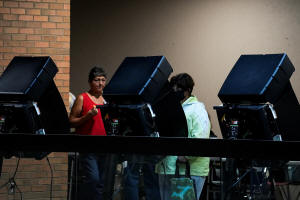Special Report-Voting-system firms battle right-wing rage against the
machines
 Send a link to a friend
Send a link to a friend
 [November 07, 2022]
By Helen Coster [November 07, 2022]
By Helen Coster
(Reuters) - Donald Trump’s stolen-election
falsehoods have thrust America’s voting machine suppliers into a
national struggle to protect their businesses.
Industry leaders Dominion Voting Systems and Election Systems & Software
are waging a political and public relations ground war to beat back
threats to their state and local government contracts, rooted in bogus
conspiracy theories about vote manipulation. Dominion has also turned to
the courts, filing eight defamation lawsuits against Trump allies and
media outlets including Fox News.
The efforts to fight misinformation have so far blocked any significant
loss of business, in part because many counties and states are locked
into long-term contracts for voting systems. But the companies are
nonetheless taking the election-denial movement seriously as the belief
in voter-fraud fictions continues to gain mainstream acceptance on the
right. About two-thirds of U.S. Republicans say they believe the
election was stolen from Trump, Reuters polls show.

Whenever companies "face a tsunami of suspicion and distrust of their
products, that poses an existential threat to their livelihood and
survival,” said Mark Lindeman, policy and strategy director at Verified
Voting, a U.S. nonprofit that promotes the use of secure voting
technology.
Dominion faces the most intense opposition because the company has
featured prominently in right-wing theories alleging its equipment
flipped votes from Trump to Biden in 2020. In all, Dominion has faced
campaigns in at least a dozen jurisdictions across eight states by
officials or activists seeking to replace Dominion voting systems based
on unproven fraud allegations, according to a Reuters review of
government records and interviews with local officials.
Among the risks: a statewide voting-systems contract Dominion holds in
Louisiana, which Trump won handily. Officials there have indefinitely
delayed awarding a new contract worth about $100 million amid pressure
from pro-Trump, anti-machine activists.
In Tuesday’s U.S. midterm elections, five counties facing voting-machine
protests — in the states of Nevada, Arizona, Pennsylvania, South Dakota
and Minnesota — plan to institute hand-counting of ballots as a check on
their machine counts by Dominion or ES&S tabulating equipment. Among
them is Nye County, Nevada, where commissioners voted unanimously to
recommend dumping Dominion touch-screen voting machines after a pressure
campaign by nationally prominent election deniers.
Voting vendors also face including well-funded national campaigns
targeting their machines. Such protests could gain steam nationally
depending on the election outcome. Election deniers who support ending
the use of electronic voting systems are campaigning in battleground
states such as Arizona, Michigan, Nevada and Pennsylvania for governor
or secretary of state — the top voting administrator.
Dominion declined to comment on its financial performance since the 2020
election and did not answer detailed questions about its campaign to
battle misinformation. The company told Reuters that it has been
“active” in “refuting the harmful lies spread about us.” Stolen-election
activists, the company said, have “damaged our company, harmed elections
officials, and diminished the credibility of U.S. elections.”
ES&S also declined to provide financial specifics but said it has not
lost customers because of the voting-machine protests. “Jurisdictions
continue to need to seek trustworthy support of their elections,” the
company said in a statement.
Both companies managed to grow their revenue in 2021, after the
contested 2020 election, according to data provided by PrivCo, which
tracks private company financial information in a proprietary database.

The assault on voting machines is at the center of a broader offensive
on the U.S. election system by a loose network of right-wing activists.
Across the country, election officials have received hundreds of threats
or menacing messages that cite debunked conspiracies involving the
machines. And pro-Trump officials and activists, on the hunt for fraud
evidence, have been accused of gaining or trying to gain unauthorized
access to voting equipment in at least 18 security breaches since the
2020 election, Reuters has previously reported.
Debunking the torrent of misinformation is costly, forcing
voting-machine companies to expand investments in litigation and public
relations, according to more than two dozen interviews with election
officials, voting-system vendors and their representatives.
Dominion has vocally rebutted voting-machine conspiracy theories in
public statements and in its defamation lawsuits. But it has kept a
lower profile in the local political fights over its contracts. The
company said it prefers to provide information and expertise to local
officials who are dealing directly with voting-machine protesters.
ES&S executives travel multiple times a month to states like Kentucky,
Wyoming and Idaho, where they participate in equipment demonstrations
for the public, according to the company. They confront questions such
as whether the machines are connected to the Internet (they aren’t) and
whether the company has foreign owners (it doesn’t). The executives
include Chris Wlaschin, the company’s senior vice president and chief of
security.
ES&S also says it helps public information officers field questions from
voters and the media even in jurisdictions where it has no business —
such as Antrim County, Michigan, where a quickly corrected error in the
initial reporting of 2020 results from Dominion machines was seized on
by conspiracy theorists to baselessly allege widespread fraud in the
state.
“When we are able to sit at that table and respond to questions, it
shows that we are not hiding,” Wlaschin said.
CHINA, VENEZUELA AND ANTIFA
Right-wing activists’ nonsensical claims about systemic vote-rigging
have overshadowed a more useful and long-running debate about legitimate
issues with U.S. voting systems, according to four election technology
experts interviewed by Reuters. Experts have long scrutinized Dominion,
ES&S and other voting technology firms over issues including security,
usability and interoperability, accessibility for people with
disabilities, and a lack of transparency around pricing and contracts.

The systems are “far from perfect,” said Lindeman, of Verified Voting,
but the torrent of pro-Trump vote-manipulation claims “make no sense
whatsoever.”
Attacks on voting machines exploded after the 2020 election, led by
Trump himself. He tweeted on Nov. 12, days after the election, that
Dominion “deleted” votes or “switched” them to his Democratic rival, Joe
Biden. As Trump’s misinformation went viral, Denver-based Dominion faced
an onslaught of Republican voter rage.
Since then, false claims about Dominion and other voting-technology
companies have caught fire, spread by local and national politicians,
aspiring pro-Trump congressional candidates, Republican activists and
right-wing media. Some have alleged without evidence that Dominion
machines were rigged in plots involving Chinese communists, Venezuelan
socialists or Antifa, the loosely organized U.S. anti-fascist movement.
Dominion is fighting back in court. Since the 2020 election, it has
filed eight defamation lawsuits against Trump allies and conservative
media outlets. None has yet been resolved. The company has sued Fox News
for $1.6 billion in Delaware Superior Court, alleging that Fox defamed
the firm by amplifying false claims about its technology in an effort to
boost ratings. In a statement to Reuters, Fox called the damages claims
"outrageous" and “nothing more than a flagrant attempt to deter our
journalists from doing their jobs.” A trial is set for April 2023.
To fight local political battles, Dominion arms state and county
election officials with data and other information to counter conspiracy
theorists. Kay Stimson, Dominion’s vice president of government affairs,
often calls in to local meetings when voting machine issues arise, to
keep abreast of the accusations or to answer questions from officials.
In Nevada, Dominion employs a high-profile consultant, former Republican
Nevada governor Robert List, who appears at county meetings as the face
of the company – someone who can sympathize with Trump supporters but
deflect blame for his loss away from Dominion.
At an April board of commissioners meeting in Elko County, for example,
List told residents that he shares their “rural values” and, as a Trump
supporter himself, was disappointed in the outcome of the election. “But
I know it wasn’t the fault of the machines,” he said, before debunking
some common claims by election conspiracy theorists.
[to top of second column]
|

People cast their votes on voting
machines inside the El Paso County Courthouse as early voting begins
for the upcoming midterm elections in El Paso, Texas, U.S., October
24, 2022. REUTERS/Paul Ratje/File Photo

$100 MILLION ON THE LINE
Some of the highest-profile attacks on voting machines have
originated with MyPillow chief executive and Trump ally Mike Lindell.
In June, at a Louisiana Voting System Commission meeting, he told
state officials that America will be lost “if we keep even one
machine in this country going forward.”
The commission was created by law in 2021 amid widespread claims of
voter-fraud and machine-rigging in the 2020 election. The law also
banned a type of voting machine that does not create an auditable
paper trail, according to a September report on the effort from the
Public Affairs Research Council of Louisiana (PAR), a nonprofit
public policy organization.
Lindell said in an interview that his goal in Louisiana and
nationally is to force the removal of all voting and voting-counting
machines and return to counting paper ballots by hand. Election
officials and experts overwhelmingly reject that idea, saying the
laborious process would make elections more vulnerable to fraud and
error, not less. Many voting security experts recommend a
middle-ground approach that already is used in the majority of U.S.
jurisdictions: hand-marked ballots, completed in private by voters
and counted by machines, which create a paper trail for audits or
recounts.
Among those calling for Louisiana to ditch Dominion machines is the
state’s Republican National Committeewoman, Lenar Whitney. At a
Republican Party meeting last year, she described Dominion as
committing “illegal and treasonous acts” in the 2020 election.
Whitney did not respond to a request for comment.
In the spring of 2021, Dominion launched a public relations campaign
in Louisiana, including ads on the radio and a conservative
political website, to fend off opposition to its bid for a new state
contract, worth about $100 million. Its executives – along with
those from other vendors – appeared at the June Voting System
Commission meeting where Lindell gave his presentation attacking the
machines. The executives provided technical answers to address
common fears of machine skeptics — reassuring them that Dominion was
U.S.-owned, and that its machines could not be remotely accessed or
rigged through components imported from China.

Authorities in the heavily Republican state acknowledge that their
aging Dominion machines, most of them bought in 2005, are outdated.
The machines Louisiana uses are no longer manufactured, requiring
the state to scavenge for parts when they break and to lease some
new Dominion machines as temporary replacements, according to the
PAR report. The machines also do not create a paper trail for
auditing, which most states now require.
Nonetheless, Republican Secretary of State Kyle Ardoin last year
abandoned a state effort to buy new machines amid protests from
anti-machine activists and complaints about the fairness of the
bidding process.
The Louisiana secretary of state’s office did not make Ardoin
available for an interview or answer questions about the delayed
contract and the pressure from stolen-election activists. The
Republican state election chief, who chairs the Voting System
Commission, invoked a “chairman’s privilege” to allow Lindell more
time to speak at its June meeting, where the pillow magnate
addressed the board for 17 minutes.
A couple of months later, on August 14, Ardoin appeared on an
episode of “The Lindell Report,” a show on Lindell’s website. Ardoin
said in the 40-minute conversation that he had sent a letter on Aug.
10 ordering local Louisiana election officials to preserve records
from the 2020 election as potential fraud evidence. The secretary of
state stopped short of alleging widespread voter fraud in 2020 but
said a “travesty of manipulation” had “changed the outcome.” He
referred to election law changes before the vote, which included
expansions of mail voting and ballot drop boxes meant to protect
voters amid the coronavirus pandemic.
Asked about voting machines, Ardoin said he had told the chief
executives of at least two machine suppliers that they needed to be
more “transparent” about the internal workings of the equipment.
Otherwise, he recalled telling them, “You’re going to go out of
business and our Republic is going to go to hell in a handbasket.”
HAND-COUNTING IN NEVADA
Dominion’s business is also precarious in Stark County, Ohio. The
local Board of Elections voted in December 2020 to replace aging
Dominion machines with more than 1,400 new ones at a cost of $6.5
million. After Trump supporters protested, citing false voter-fraud
claims, the county’s all-Republican Board of Commissioners voted in
March of 2021 to withhold funding for the machines, arguing the
county could save money by using other voting-equipment vendors.
The county’s Board of Elections sued the commissioners in April last
year to try to force them to buy the machines in time for primary
elections. The Ohio Supreme Court ruled in May 2021 that the
elections board has authority to select voting technology, and that
the county must go ahead with the purchase of Dominion machines. The
county complied with the ruling.
Members of the elections board and the county commission did not
respond to requests for comment.

In Nevada, a critical election battleground, seven county
commissions have considered changing their election systems, by
switching voting-equipment vendors or getting rid of the machines
altogether. Five of the counties have not moved forward on the
proposals, but two have started making changes.
In December 2021, officials in Nevada’s rural Lander County voted to
switch from Dominion to ES&S – a vendor used by just one other
Nevada county. A Lander County elections technology official told an
October board of commissioners meeting that replacing Dominion
machines was a “positive change to help regain trust in the system.”
County officials approved spending more than $223,000 on new ES&S
equipment and an additional $69,000 for equipment installation,
training and maintenance.
In Nye County, where Trump won 69% of votes in 2020, commissioners
voted 5-0 in March to request that the county clerk ditch Dominion
touch-screen voting machines and require voters to submit paper
ballots.
The county plans to continue using Dominion vote-counting machines,
but also to separately hand-count the ballots to confirm the result.
Newly elected County Clerk Mark Kampf in September called the
continued use of Dominion tabulators a “stopgap measure” as the
county researches whether it can exclusively hand-count in the
future.
Commissioners were persuaded after a presentation led by Jim
Marchant, a Republican candidate for Nevada Secretary of State who
falsely claimed voting machines were rigged against Trump in 2020.
Marchant is running in a close race and could become the state’s top
election official.
“Why is it even a possibility we would even use any of these
electronic voting machines at all?” Marchant asked in a March 3
email to Nye’s commission chair, obtained by Reuters in a public
records request.
Marchant did not respond to requests for comment.
The decision by Nye’s commissioners amounted to a recommendation.
Only the county clerk could legally implement it. Nye’s longtime
Republican clerk, Sandra Merlino, said she took early retirement in
August out of frustration with the move to scrap the machines. Her
replacement, Kampf, has claimed Trump won the 2020 election. He
moved quickly to implement the hand-counting plan.

Kampf did not respond to a request for comment.
Nye’s move to paper ballots and its possible switch to exclusively
hand-counting could cost Dominion. The company had been receiving
more than $50,000 annually for maintenance and other services,
according to Merlino, the former clerk. Dominion machines remain in
use in 14 of Nevada’s 17 counties.
Merlino said she was stunned the commissioners voted for junking the
machines and returning to old-fashioned hand counts.
“I thought: My commissioners are not going to go for this,” she
said. “But they did.”
(Reporting by Helen Coster; editing by Kenneth Li, Jason Szep and
Brian Thevenot)
[© 2022 Thomson Reuters. All rights
reserved.]
This material may not be published,
broadcast, rewritten or redistributed.
Thompson Reuters is solely responsible for this content. |